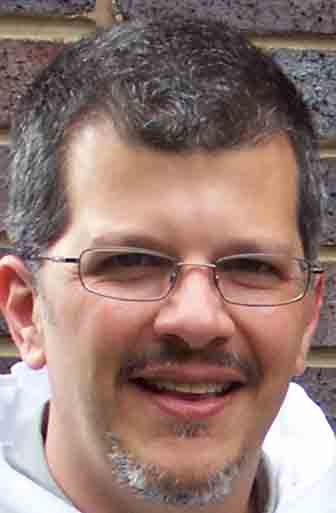Is God deaf? Is God unwilling to pay attention to us? Unable to hear us? The psalmist asks that very question on several occasions in the Psalter, especially in the presence of thriving evil and violent oppression. Often the psalmist will wonder where God has run off to. We behave outwardly as if God can hear and can respond. In just a few moments, after I finish preaching and we say the Nicene Creed together, we will be led in prayer. Does this verbal ritual match what we believe inside? Do we believe what we ask for is even possible? Whenever our community gathers for the Eucharist, we pray for things specified for us to include in the Prayers of the People in our Book of Common Prayer: the Church, the world, the local community, the sick and suffering, the dead. It doesn’t work - or at least doesn’t seem to - at least not totally. The old wars continue and new ones flare up. Church factions argue and divide. Politicians lie and cheat. People continue to be sick and in pain. A skeptic would observe our persistent praying for peace in our church and world, for justice among nations and peoples, for healing and wholeness for those we love, and ask a simple question: If God is so loving and merciful, if God is not deaf but listening and desires that we live rightly with God in the world and with each other, where’s the evidence that our praying makes any difference? How would we answer such a skeptic? In searching for a certain quote on Google I came across this review on Amazon.com for Thomas Merton’s book New Seeds of Contemplation:
This is supposed to be a great spiritual book. I found the author to be hopelessly lost in a bunch of words which mean nothing. This is one of those "spiritual" books that are really the result of the author bewitching himself with the trappings of language. I think that Merton actually believes that he is saying something when all he is doing is using vaguely defined words and terms which can mean anything-or absolutely nothing (the more likely possibility). If you think that sitting in complete silence and solitude for hours on end is the way to learn something, get this book. If you think that that is the way to delude yourself and possibly go mad as a hatter, skip this one. Read one "mystical" treatise, and you have read them all. If "contemplation" is such a great way to gain knowledge, why is it that all of these books say the same insipid things?
Are we not guilty of “bewitching ourselves with the trappings of language” at times? Is not so much of the valid criticism of the church that we say and proclaim great ideals and hopes when we’re in the spotlight, when it fits into the expectations of the group, but either dismiss them or forget them when we’re off the stage, alone in our own worlds of real fear and doubt? We assent to God as mystery, but what we really want is a predictable interventionist God who follows our plan.
The rationalist points out the absurdity of a God who could possibly reach down to cooperate and participate in our needs and longings when we ask. The critic has a point. The holy absurdity we call prayer pushes us to the edge of the cliff of rational and reasonable expectations and asks us to jump into the bottomless nothingness of faith. Prayer dares command that we move from the head to the heart, from the rational to the mystical, from words to silence, from what we can control and measure and evaluate, to the mystery of a God who exists beyond space and time. Prayer is most fully about relinquishing our own wills, shedding the selfish skins of our egos, and emptying ourselves of our agendas of what God must do. In our materialistic culture, such a practice seems absurd. And it is.
I’ve never met anyone who said “After carefully considering all the historical evidence and weighing the intellectual merits of various truth claims in the world’s religions, I have come to the conclusion that Christianity is the most verifiably accurate, therefore I will give my heart and my life to Jesus and follow him forever.” At some point we let go of figuring it out and just trust and leap.
The Epistle lesson from 1 Timothy is as fascinating and important for what it doesn’t say as for what it does. The Message Bible puts the first few verses this way:
1-3The first thing I want you to do is pray. Pray every way you know how, for everyone you know. Pray especially for rulers and their governments to rule well so we can be quietly about our business of living simply, in humble contemplation. This is the way our Savior God wants us to live.
It’s an injunction to prayer, but is not concerned with the how to’s or the results so much as about life itself. Prayer is the road to get to the simplicity and humility that God desires for us. “Pray every way you know how, for everyone you know.” Period. Leave the rest to God.
In our culture of addiction to efficiency, effectiveness, and success, praying for certain things to happen and then watching as it appears at least that nothing happens can be a frustrating experience. Rather than expect God to comply with our definitions of efficiency and effectiveness, we do well to listen to God’s better, although harder and more mysterious way of dealing with humankind. Prayer includes our intercessions but goes beyond asking. It’s about relationship, an encounter with our maker and redeemer that transcends request and answer. God wants us, not just our prayers. God listens to our whole lives, not just the words we say. If we limit God’s response to our prayer by what is visible and knowable, then we have missed the invitation not just to make requests, but to allow the very act of asking to come into God’s loving transformation. At a moment of epiphany in the movie “Shadowlands” C.S. Lewis, played by Anthony Hopkins, replies to an assurance of prayer from a friend that “I pray because I can’t help it. I pray because I don’t know what else to do. Prayer doesn’t change God, it changes me.” It could be that we overlook the power of our praying to sharpen our consciousness and remind us that we are called to co-operate with God in working for the change we seek. The Epistle also reminds us that in a real way it is not me praying but Christ praying me. I am simply being open to what the Epistle calls the mediation of Christ in me and through me. Christ taking my wobbly attempt at reaching out and making it stand on two strong legs. The beauty and the wisdom of the monastic tradition, especially the Benedictine tradition, is its emphasis on an integrated, whole life. I catch myself from time to time imagining that I am stopping my work so that I can go and pray, when in fact Benedict would say that my work is my prayer and my prayer is my work. The focus is on God who is present, available, and all ears.
Prayer as described in the letter to Timothy is the free, spontaneous, and sincere opening of myself to God’s presence in the humble acceptance of reality, acknowledging the mystery of God’s response and purpose beyond my own understanding, in the hopeful expectation that God guides me toward becoming who I was made to be. In the realm of the spirit, the categories of efficiency and effectiveness have no meaning. To the skeptic whom I may not be able to convince with intellectual argument but to whom I can listen with gentleness and respect and invite him into a journey of the soul, leaving the rest to God.
Is God deaf? God is deaf to our hopelessness in the face is seemingly unchangeable problems. God is deaf to our pious faces which mask the doubt and anxiety which we think we can hide. God is deaf to our smug arrogance and dogmatic righteousness that judges the hearts of others and builds walls of suspicion. What does God hear? God hears the real self. God hears our burst of gratitude, our cry for mercy and help. God hears the sacrifice we make of our lives to serve our neighbor. God hears my “thanks” for all that has been and my “yes” to all that will be. Amen.
Wednesday, October 10, 2007
Subscribe to:
Post Comments (Atom)




6 comments:
Randy,
I stumbled into this blog site while preparing to answer your email about having lunch.
The sermon is lovely. I like the comment about Merton and your different thoughts on the matter. Thanks. Isabel is my granddaughter's name - AES+
This is a wonderful sermon that reminded me in my busyness how much prayer really is about listening to God rather than telling God what to do. It's about what you call Benedictine spirituality: our whole life is a prayer, and I might add: we spend our whole life converting to that life of prayer.
Thank you for that insight.
Good stuff, Randy! Liked the "wobbly attempt" especially. (Hey, Webmaster! Keep this one up so I can come and think about it some more).
Hello. This post is likeable, and your blog is very interesting, congratulations :-). I will add in my blogroll =). If possible gives a last there on my blog, it is about the Home Broker, I hope you enjoy. The address is http://home-broker-brasil.blogspot.com. A hug.
Hey Randy,
Was trying to find your email address and found your blog! Thanks, God always opens the right doors at the right time and prayer has been something I have been praying about!!!
Hope I find your email
MarcusSDTaylor@aol.com
where have you gone, Br. Randy? i just found your blog...read one post, and wanted to tell you it was exactly what i needed to read this morning. thank you. please come back? there are people who God reaches through you...like me for instance. :)
Post a Comment